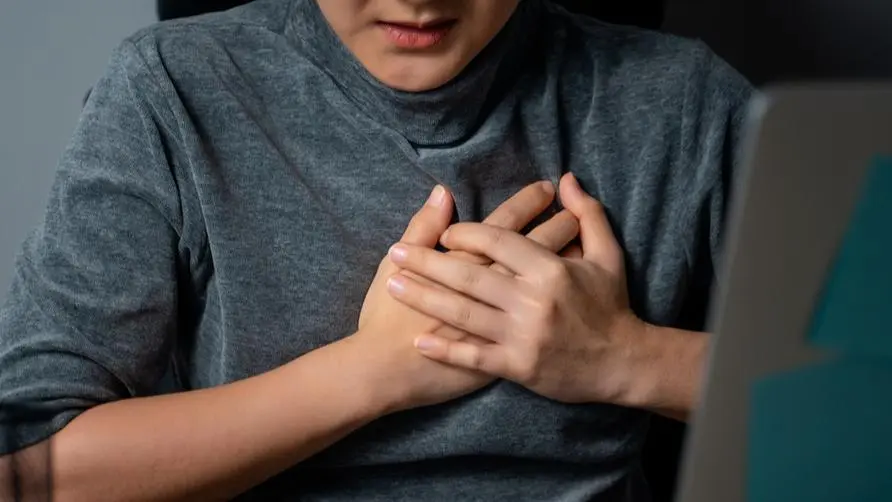Women who encounter "sexual harassment" are sad and even hurt their bodies! Harvard: The chance of suffering from "hypertension" increases by 21%

Women are subjected to “sexual violence”, such as sexual harassment or sexual assault in the workplace, which may not only affect their psychological state, but also cause harm to cardiovascular health? According to a large-scale longitudinal study recently published in the Journal of the American Heart Association (JAHA), those who have been sexually assaulted during their lifetime have a higher chance of developing high blood pressure than the average woman. This is the first large-scale study to link stressful or traumatic experiences to cardiovascular disease.
Harvard study: Women who experience sexual violence are 21% more likely to develop high blood pressure
Harvard Medical School and the University of California in the United States gathered 33,127 women aged 43-64 for random interviews since 1989, and collected the subjects’ traumatic experiences in the past seven years, such as car accidents, natural disasters, accidental death of relatives, and sexual violence. etc., as experimental data analysis. Preliminary data shows that about 23% of women among the subjects have experienced sexual assault, 12% of women have experienced sexual harassment in the workplace, and 6% of women have experienced both situations.
Research points out that women who have been sexually assaulted, sexually harassed, and both have an increased chance of developing hypertension by 11%, 15%, and 21% respectively. The research team pointed out that the possible underlying mechanism of this phenomenon is that stressors can directly affect physical health through biological mechanisms, such as excessive stimulation of the pituitary gland, adrenal axis and sympathetic nerves in the brain, as well as poor endothelial cell function.
In addition, BMI or eating habits may also be potential factors; previous studies have pointed out that women who have experienced sexual violence in the past are more likely to develop bad habits such as smoking, alcoholism or drug abuse, and are also less likely to be obese or overweight. Females are taller. However, there are still some biases in this study, such as the subjects’ recall fragments may be different from reality. In addition, hormonal imbalance caused by menopausal menopause in women may cause errors in blood pressure measurement values.
Sexual violence affects both men and women! US CDC: May cause serious physical and mental illness
In addition to causing damage to women’s cardiovascular health, a study involving 4,011 participants in “Frontiers in Psychology” showed that sexual harassment in the workplace may cause physical and mental illnesses for both men and women, such as depression, sleep disorders, musculoskeletal injuries, etc. If the company system is less transparent and there is no distinction between rewards and punishments, the correlation with sexual harassment incidents will be stronger and there will be more sexual harassment incidents.
Guidelines issued by the US CDC indicate that the consequences of sexual violence may be physical injuries (such as bruises or genital injuries); they may also be psychological injuries, such as depression, anxiety, and suicidal thoughts. Previous research has shown that victims of sexual violence have higher rates of post-traumatic stress disorder (PTSD) and are more likely to suffer from reproductive, gastrointestinal, cardiovascular and sexual health problems.
The CDC says victims of sexual violence are more likely to smoke, drink alcohol, use drugs and engage in risky sexual behaviors. In addition, trauma caused by sexual violence may affect employment performance, including mental instability, poor job performance, unemployment, or inability to work. These problems undermine the ability to sustain life and have long-term consequences for the economic well-being of victims and their families. Additionally, victims may have difficulty maintaining relationships and returning to places such as work or school.
The Taiwan Ministry of Health and Welfare calls out that as long as one encounters words or actions related to sex or gender that make an individual feel uncomfortable or uncomfortable, and feels offended or insulted, this may constitute sexual harassment or sexual violence. Serious sexual harassment can even evolve into sexual assault or forced indecency. Therefore, if you encounter sexual harassment, you should have the courage to stop the other party, or call the 24-hour hotline “113” directly for further assistance.
Source:
Sexual Harassment Prevention-Taiwan Ministry of Health and Welfare
Fast Facts: Preventing Sexual Violence
The Impact of Workplace Harassment on Health in a Working Cohort
Further reading:





